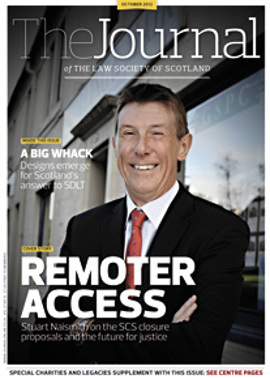Law reform roundup
Legislative statement
First Minister Alex Salmond opened the new parliamentary session on 4 September, announcing 15 new bills for 2012-13. The Law Reform Committee and its subcommittees will have considerable interest in 11 of the 15 bills, including the Land and Buildings Transaction Tax Bill, which will set out how the proposed replacement for stamp duty land tax will operate; the Criminal Justice Bill, which will reform and modernise the system for investigation and prosecution of crime in Scotland, following Lord Carloway’s review; the Referendum Bill, which will make provision for an independence referendum to be held in autumn 2014; and the Marriage and Civil Partnership Bill, which will allow same-sex couples to marry and civil partnerships to be registered through a religious ceremony.
Full details of each of the bills can be found in the latest edition of Law Matters, the Society’s parliamentary newsletter for MSPs, which can be found on our website at www.lawscot.org.uk/news/newsletters/law-matters
Civil Justice Council etc Bill
Following on from its written evidence on the Scottish Civil Justice Council and Criminal Legal Assistance Bill in July, the Society provided oral evidence to the Justice Committee on both parts 1 and 2 of the bill in September. Ronnie Conway, of the Civil Justice Committee, reiterated the Society’s support for one overarching Civil Justice Council, but voiced concerns over the number of solicitor members, calling for at least six to be included.
Oliver Adair and Ian Moir of the Criminal Legal Aid Team attended to give evidence on part 2 of the bill, and reiterated the concerns that the proposed threshold at which contributions would become payable (£68 disposable income per week) is too low and not a realistic amount from which to expect anybody to pay towards their legal costs. They also argued that the Scottish Legal Aid Board rather than solicitors should collect the contributions, to ensure a consistent system.
Carloway Report
The Society’s Criminal Law Committee has responded to the Scottish Government’s consultation on Lord Carloway’s report. In its response the committee reiterated its serious concerns over the proposals to remove the requirement for corroboration in Scots law and its belief that any change to the law in this regard should form part of a full scale review of Scottish criminal procedure. The committee also stated that if corroboration is removed, it is vital that careful consideration is given to the introduction of new safeguards to minimise miscarriages of justice based on uncorroborated allegations.
There are however a number of other proposals within the consultation which the Society is pleased to see, such as the introduction of police bail and the reduction of the maximum detention period without charge to 12 hours, with a review after six hours. It also welcomes the proposals for greater support for vulnerable suspects; and the introduction of a “letter of rights”.
BIS consultation
The Employment Law Committee responded to the BIS consultation on collective redundancies: changes to the rules. The committee raised concerns about the proposal to reduce the 90 day consultation period to 30 or 45 days, stating that it could not see how this would help reduce the number of redundancies, merely making it easier for employers to get rid of large numbers of people in a shorter time. It also suggested that introducing a non-statutory code of practice would not encourage employers to engage in meaningful consultation.
The committee was supportive of the improvement of guidance on support available to both employers and affected employees during a redundancy situation, but stated that thought would have to be given as to how this was publicised to employees so they could adequately find the resources to help them.
HMRC GAAR consultation
The Tax Law Committee responded to this consultation, which proposes to introduce a general anti-abuse rule (“GAAR”). The committee stated that it was generally supportive of HMRC’s stated aims to deter and counter artificial and abusive tax avoidance, whilst retaining a tax regime that is attractive to businesses. The committee also stated its support for the introduction of an appropriately drafted GAAR if this was part of a package to replace complex and incomprehensible anti-avoidance legislation. The committee has a genuine concern about the increasing complexity of the UK tax system, and should a GAAR be introduced, would like to see a full review taken of the existing UK tax legislation to identify which parts of the legislation could be repealed or modified.
Full details of the above, and further information on the current work of the Law Reform Department, can be found at www.lawscot.org.uk/forthepublic/law-reform-consultations; and the team can be contacted on any of the matters above through louisedocherty@lawscot.org.uk, or follow us on twitter @lawscotIn this issue
- Players and winners
- Access to client money?
- Tax and residential property
- Trusts and the family business
- Planning: the next level
- Reading for pleasure
- Opinion: Tom Mullen/Alan Paterson
- Council profile
- Book reviews
- President's column
- Deed plan criteria
- Decision time for justice
- "Can do": can you?
- Taxes heading north
- When the agent answers
- Taking care of child cases
- Collective redress
- Making sense of hearsay rules
- Don't forget the register
- Alcohol: the healthy option
- Seeding scheme is a draw
- Scottish Solicitors' Discipline Tribunal
- Human trafficking: is the system responding?
- Power points and positive rights
- A way to apply yourself
- Society presents "ambitious plans"
- Law reform roundup
- Business benefits
- On the right track
- Ask Ash
- Business radar
- Legacies: the untapped potential
- Charity begins at law
- Love them and leave to them
- Those difficult relatives






